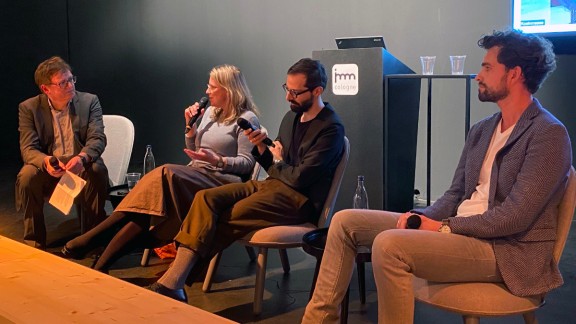Smart living, connected living
Working from home is driving innovation – our homes are becoming digitalised smart homes faster than expected as a result of new usage patterns. That is not only because of the coronavirus pandemic. The growing acceptance of connected solutions is also down to improved services and everyday products for the connected home. These global development trends will be a key topic at the next edition of imm cologne.

Connected Home Trends 2021
Smart furniture as a future-oriented interiors trend
How new technologies develop is always dependent on the generations and the way they live. Over the next few years, more and more digital natives will be starting their professional lives, boosting demand for modern furnishing solutions. The consumer behaviour of Generation Z differs greatly from that of previous generations.
“The so-called digital natives have a highly application-oriented view of smart furnishing, and they take smart TV, online fitness courses and the availability of digital media in every room for granted. The majority are also open to virtual assistants, wearables and a new level of connectivity between the individual and their living environment.” – Bernd Sanden, Director of LivingKitchen and also responsible for the
Bernd Sanden
Director d LivingKitchen and responsible for Smart Village at imm cologne
Three major developments in the connected home
The latest smart home trends are clearly moving from individual stand-alone solutions to holistic digital living concepts. They combine youthful entertainment with family-friendly functions. Connected living already offers digital functions for work and leisure, connected sporting activities and cultural offerings. This comprehensive approach will continue to gain ground in 2021 and beyond, reaching into the smallest niches of modern interior design thanks to smart furniture.
Smart home networks
The home is becoming a hub. Remote working and home schooling are making it more necessary than ever to connect our homes with educational and professional environments. And applications for our personal lives are also digital: online shopping by video chat , streaming apps and home cinema, and personal finance and pension provision tools are now changing the way we do many conventional everyday tasks. The Smart Mirror by Mues-Tec integrates internet access into a stylishly designed mirror. With its touchscreen and virtual assistant, it provides fast access to individually configurable information. This window to the digital world allows us to stay in touch with the outside world, bringing it into our bathrooms and living rooms.
The home is becoming a hub. Remote working and home schooling are making it more necessary than ever to connect our homes with educational and professional environments. And applications for our personal lives are also digital: online shopping by video chat, streaming apps and home cinema, and personal finance and pension provision tools are now changing the way we do many conventional everyday tasks. The Smart Mirror by Mues-Tec integrates internet access into a stylishly designed mirror. With its touchscreen and virtual assistant, it provides fast access to individually configurable information. This window to the digital world allows us to stay in touch with the outside world, bringing it into our bathrooms and living rooms.
Integrated services
Architects and property developers are already designing apartments with a focus on digital infrastructure. One of the most important aspects in this is the issue of connectivity: cloud information exchange for energy supplies, door locks with smart sensors that respond to your smartphone, and further automation in household services. Robot vacuums have long represented a straightforward introduction to the smart home. In future, the Always Home Cam by Ring will make it possible for us to look into our homes wherever we are. This compact drone for indoor areas can be used for a variety of purposes, from security to planning the shopping. And the Plantcube by Agrilution , for its part, is a fully automated miniature greenhouse that provides a guaranteed supply of herbs and lettuce.
Digital workouts
With interactive solutions, developers are bridging the gap between personal fitness programmes and competitive group events. The Peloton indoor exercise bike makes it possible to take part in virtual bike races or in live sessions with friends. The VAHA fitness mirror takes on the role of a virtual fitness coach that employs artificial intelligence to analyse and improve movement patterns. These premium products are confidently integrated into the rooms in our homes, bringing fun fitness activities into the smart home. And that with success: the American College of Sports Medicine’s Fitness Trends 2020 report predicts that this market will grow by around 6 per cent annually until 2025.
Future outlook: connected living in the next few years
The global pandemic has forced us to reconsider the future of our homes’ interiors. With meeting up in person now difficult, digital technology must create new solutions that focus on interaction, integration and quality of life. Streaming providers are already looking for formats that allow social interaction when streaming together despite being in different locations. Connecting the various everyday worlds and providing barrier-free access to connected living are becoming more important than ever.
Intelligent furniture and connected equipment are developing at a rapid pace. Those who are keen to find out about other highlights from this field will find inspiring ideas and networking possibilities at ambista .








